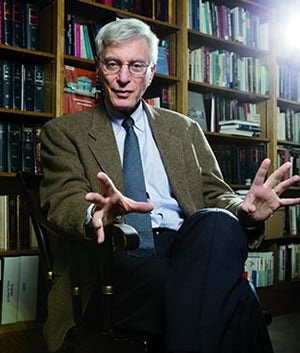HLS faculty play historic role in organization that synthesizes and shapes U.S. law
When Harvard Law Professor Daniel Meltzer ’75 was named director of the American Law Institute in January, he joined a long line of members of the HLS community who have helped shape the direction of the law from inside the ALI.
Founded in 1923, the organization produces scholarly publications whose titles may seem dry, but which have proved enormously influential in U.S. courts and legislatures, as well as in legal scholarship. Among the most high-profile of its publications are its restatements.
“If you’re a busy judge and … you get an issue in which the law of your state isn’t all that well developed, or in which the opinions aren’t all that comprehensive or, frankly, all that good,” Meltzer said, “I think it’s enormously useful to be able to pull a restatement off the shelf and get a very well-thought-out explanation of what the law of torts should be in this area, with illustrations about how it applies in different fact patterns. And so I think, for that reason, judges have relied on them heavily.”
The first sets of restatements were written between 1923 and 1944, with many Harvard Law School professors involved in producing these go-to sources for judges and lawyers. Over the years, the original restatements have undergone revisions, and more have proliferated, often under the guidance of HLS faculty. When Meltzer was a law student at the school in the early 1970s, he recalls, three of his five professors had been or were about to be reporters in the ALI.
The ALI has also expanded its reach beyond restatements into principles projects, which articulate ideal principles in less well-developed areas of law, model statutory codes, and other studies and research projects. Many of these projects have also turned out to be instrumental in influencing the direction of the law.
[pull-content content=”
More reporting on reporters (and other ALI participants)
HLS faculty members first figured prominently in the ALI in 1928, when Warren Seavey (LL.B. 1904) served as a reporter for the restatement of agency. Other faculty reporters on restatements followed, including Austin Scott (LL.B. 1909) for conflict of laws, Samuel Williston (LL.B. 1888) for contracts and Edward Thurston (LL.B. 1901) for torts.
Today, numerous Harvard Law professors are involved in ALI projects, including John Goldberg on torts; Jack Goldsmith and Gerald Neuman ’80 on the foreign relations law of the U.S.; Charles Fried and Mark Tushnet on government ethics; and Daniel Halperin ’61 and Robert Sitkoff on the law of charitable nonprofit organizations. In addition, Sitkoff and Senior Research Fellow and Lecturer on Law Margaret Marshall are members of the ALI Council, the organization’s governing body.
It should also be noted that Meltzer’s leadership at the ALI will follow that of Lance Liebman ’67, director since 1999. And although Liebman is a professor a Columbia Law School and the school’s former dean, he himself served for more than 20 years on the HLS faculty.” float=”right”]
One such project—the Model Penal Code—was promulgated in 1962. It did not purport to restate what the law was but rather was an effort to create a model criminal code that in numerous ways departed from the law in many jurisdictions. It became an enormously influential document, said Nancy Gertner, HLS professor of practice, former federal District Court judge and ALI member.
“It proposed doing what no other organization or, indeed, legislative body had done, which is to systematize substantive criminal law,” Gertner said. “Any criminal law student knows the chaotic situation that predated the code—multiple common-law definitions of crime, differences across the country.”
Now, two-thirds of American states follow the basic structure and vocabulary of the MPC in their own criminal codes. Where it has not been adopted, Gertner said, it often serves as a template for interpreting existing law.
Unlike many restatements, the MPC has never undergone a full revision. So, over the last few years, the ALI has initiated three projects to update certain sections. One of these—on capital punishment—was called a “tectonic shift in legal theory” in The New York Times and was helmed by an HLS professor, Carol Steiker ’86, and her brother University of Texas School of Law Professor Jordan Steiker ’88.
After a lengthy inquiry, the ALI concluded that it was no longer confident that capital punishment could be fairly administered and it withdrew the model statute. “It was very significant that an organization like the American Law Institute, which commands a great deal of respect in the profession, and is not viewed as a radical group, was no longer prepared to stand behind capital punishment,” Meltzer said.
Two other MPC projects are underway and retain several HLS faculty members as advisers. One, which Meltzer and Gertner are working on, aims to provide better recommendations to sentencing commissions. Another project—involving Meltzer, Carol Steiker, and Professors Jeannie Suk ’02 and Ronald Sullivan ’94, director of the Harvard Criminal Justice Institute—will revise the MPC’s treatment of sexual assault. States vary enormously in how they treat such crimes, and the MPC’s recommendations are no longer appropriate, Meltzer said. The new study provides an opportunity for the ALI to sensibly define these crimes in line with current norms.
“One of the continuing challenges for the ALI is to identify projects in a changing legal environment—one in which, for example, statutes now dominate the common law, and in which more and more legal problems have transnational implications,” Meltzer said. “I hope to continue the ongoing work to bring our distinctive expertise and processes to bear on an evolving legal terrain.”
